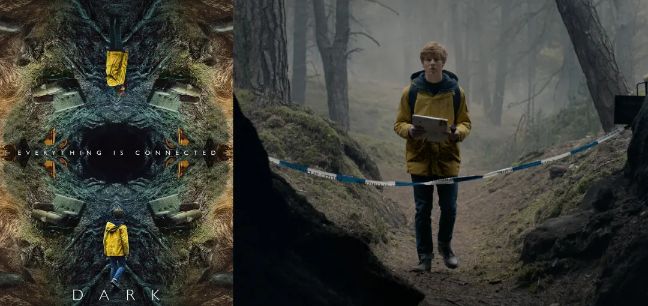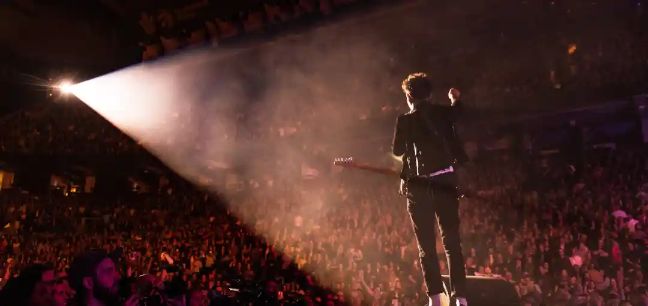The Timeless Allure: Unveiling the Addictive Enigma of 'Dark'
4 min read
03 Apr 2024
"Dark," a German science fiction thriller series created by Baran bo Odar and Jantje Friese, emerged as a captivating enigma that lured audiences into its intricate and mysterious narrative. The show's unique blend of time travel, complex characters, atmospheric storytelling, and philosophical themes has resulted in a level of addiction rarely seen in television. The allure of "Dark" transcends traditional entertainment, drawing viewers into a web of existential questions and intellectual stimulation.
A Time-Bending Enigma: The Appeal of Complexity
At the core of "Dark" lies a narrative that spans multiple timelines, generations, and interconnected characters. The show introduces a puzzle-like structure that challenges viewers to piece together the intricate threads of the story. This complexity is not just a narrative device; it's an invitation to engage deeply with the show's world and themes.

The intricately woven timelines create a sense of anticipation, as viewers become detectives unraveling the mysteries that bind the characters' fates. The puzzle-solving aspect fuels the addiction, enticing audiences to analyze details, connect dots, and speculate on the outcomes.
Characters of Depth: A Human Touch Amidst Complexity
While "Dark" boasts a complex narrative, it is anchored by characters who are deeply human and relatable. The show dedicates ample time to exploring the emotional landscapes of its characters, allowing viewers to empathize with their struggles, flaws, and desires. Whether it's Jonas Kahnwald, Martha Nielsen, or the enigmatic Stranger, each character is a vessel for profound introspection.
The portrayal of human emotions within a time-bending narrative creates a resonant contrast. The characters' personal journeys serve as a thematic compass, grounding the narrative in universal experiences of love, loss, and existential questioning.
Time as a Narrative Device: Intellectual Stimulation
Time travel is more than a plot device in "Dark"; it's a canvas upon which the show paints its intricate narrative strokes. The manipulation of time serves as a metaphor for life's complexities, choices, and consequences. This philosophical exploration elevates the show beyond mere entertainment, inviting viewers to contemplate the nature of existence and the inevitability of fate.
The intellectual stimulation triggered by "Dark" is a major factor in its addictive appeal. Viewers are presented with philosophical questions about free will, determinism, and the cyclical nature of time. The show prompts reflection on how individual actions ripple through time and shape destinies.
Atmospheric Storytelling: A World of Shadows
The atmospheric quality of "Dark" is another element that captivates viewers. The show's visual and auditory aesthetics create an immersive experience, immersing the audience in a world of shadows, mysteries, and a haunting sense of foreboding. The gloomy tones, haunting music, and meticulously designed sets evoke a palpable sense of unease, drawing viewers into the enigmatic atmosphere.
The show's ability to evoke emotions through its visuals and soundscape adds a layer of addiction. Each scene is carefully crafted to elicit a visceral response, whether it's curiosity, tension, or a sense of wonder.
Narrative Symmetry: A Rewarding Puzzle
"Dark" masterfully constructs a narrative symmetry that rewards attentive viewers. As storylines converge and diverge across time periods, viewers are rewarded with "aha" moments that provide a satisfying sense of revelation. This narrative payoff fuels the addiction, as viewers yearn to uncover the puzzle pieces that fit together to form a cohesive whole.
The narrative symmetry also underscores the show's themes of interconnectedness and cyclical patterns, inviting viewers to consider the eternal loop of time and the perpetual nature of human struggles.
Community and Conversation: Shared Addiction
As of my last knowledge update in September 2021, the sense of community and shared addiction around "Dark" was palpable. However, developments may have occurred since then. The show's complexity and philosophical themes fostered a vibrant online community where fans dissected episodes, theories, and symbolism. The shared experience of untangling the narrative web amplified the addiction, creating a sense of camaraderie among viewers.
The Alchemy of Addiction
"Dark" is more than a television series; it's an intricate tapestry of mystery, philosophy, and human emotion. Its addictive nature stems from a perfect storm of elements: narrative complexity, relatable characters, intellectual stimulation, atmospheric storytelling, and a sense of shared exploration.
As viewers navigate the twists and turns of "Dark," they are drawn into a labyrinth of time, mystery, and existential pondering. The show's ability to ignite intellectual curiosity while simultaneously evoking emotional resonance is the alchemy that fosters addiction. "Dark" transcends entertainment, becoming a conduit for introspection, conversation, and an unquenchable thirst for discovery.



